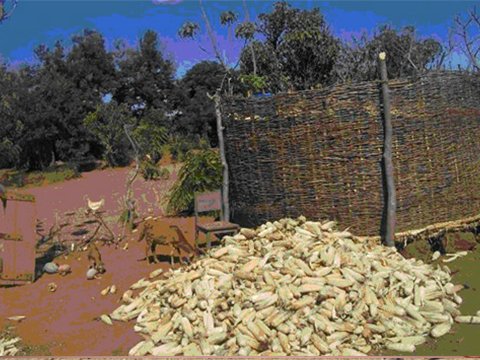Introduction: The Meaning of February in Malawi
In Malawi, February is widely known as the “month of hunger”—mwezi wa njala. My brother was born in February, and even in the village, it’s easy for people to remember the month because it’s associated with hunger. This time of year is particularly hard for rural families as their food supplies run low, and they await the next harvest.
Malawi depends on rain-fed agriculture, which runs from December to April. Most crops are planted in December, with harvesting beginning around late March or April. This annual cycle means that by February, food supplies are typically at their lowest, making it a difficult month for many Malawians.
A Different Story This Year: The Food Crisis in Malawi
This year, however, the situation is worse than usual. Food shortages across Malawi are overwhelming, and the outlook is bleak. ADMARC depots are rationing grains, and some depots don’t even have maize available. Long queues at these depots show just how dire the situation has become.
Why Are We Facing Hunger?
Several factors have contributed to the current food crisis:
• Last Season’s Poor Harvest: Many regions in Malawi faced droughts, flash floods, and dry spells during the last farming season, leading to a poor harvest.
• Small Land Holdings: Most families in Malawi rely on a piece of land less than a hectare in size to produce food and income for a family of around six people. With just one planting season per year, many families don’t harvest enough food to last until the next season.
• The Depreciating Kwacha: The constant devaluation of the Malawi Kwacha has made it difficult for the average person to afford imported goods, further exacerbating the problem.A Grim Picture on the Ground
Prominent figures, including President Arthur Peter Mutharika, have acknowledged the hunger crisis, though opinions differ on its severity. Regardless of how the situation is framed, the reality is that Malawians are suffering. Long lines at ADMARC depots and the rationing of grains paint a clear picture of a country struggling to feed its people.
My Reflections: Why Does This Keep Happening?
It is ironic and frustrating that a country like Malawi, which has been independent since 1964 and has avoided civil wars, continues to struggle with famine. While El Niño and other natural disasters are part of the problem, they are not the only cause.
Successive governments have failed to address the root causes of food insecurity in Malawi. While some years are better than others, we remain trapped in the February cycle—mwezi wa njala. Government policies have consistently fallen short of providing long-term solutions to this issue.
But we, as citizens, also bear some responsibility. Many of us fail to plan for the future, relying on the government to solve problems that we should also be addressing. A lack of foresight and planning means that when disaster strikes, we are unprepared.
Proposed Solutions: Breaking the Cycle
We all agree that the current situation is dire, and immediate action is needed to provide food to those in need. However, going forward, we need a comprehensive strategy to ensure food security for the entire nation.
Short-Term Solutions: Supporting Each Other
While the current food crisis can’t be fixed overnight, donating food to those in need is one way to help. Even small gestures, like sharing a meal with a neighbor or relative, can make a big difference during this difficult time. It’s in our nature as Malawians to share what little we have, and I hope this spirit continues.
Long-Term Solutions: Policy Changes and Agricultural Reform
• Irrigation and Greenhouse Farming: We can no longer rely solely on rain-fed agriculture. The government must promote and subsidize irrigation and greenhouse farming to ensure year-round food production.
• Improving Access to Fertilizers and Seeds: The government should also subsidize fertilizers and seeds to help farmers increase their yields. Buying these resources during the harvest season, when the Kwacha is stronger, could reduce costs for farmers.
• Encouraging Food Storage: We should return to the practices of our forefathers, who stored food for difficult times. Not just maize, but also dried meat, vegetables, and peanut butter can be made and stored for future use.
• Increased Harvest Cycles: By utilizing irrigation, families can farm two or three times a year, increasing food production and ensuring that the small plots of land they own are used more efficiently.Conclusion: A Brighter Future for Malawi
It’s clear that Malawi is facing a tough time, but with the right policies and a collective effort, we can break the cycle of food insecurity. By planning ahead, supporting each other, and investing in sustainable agricultural practices, we can emerge from this crisis stronger, braver, and more enlightened.
